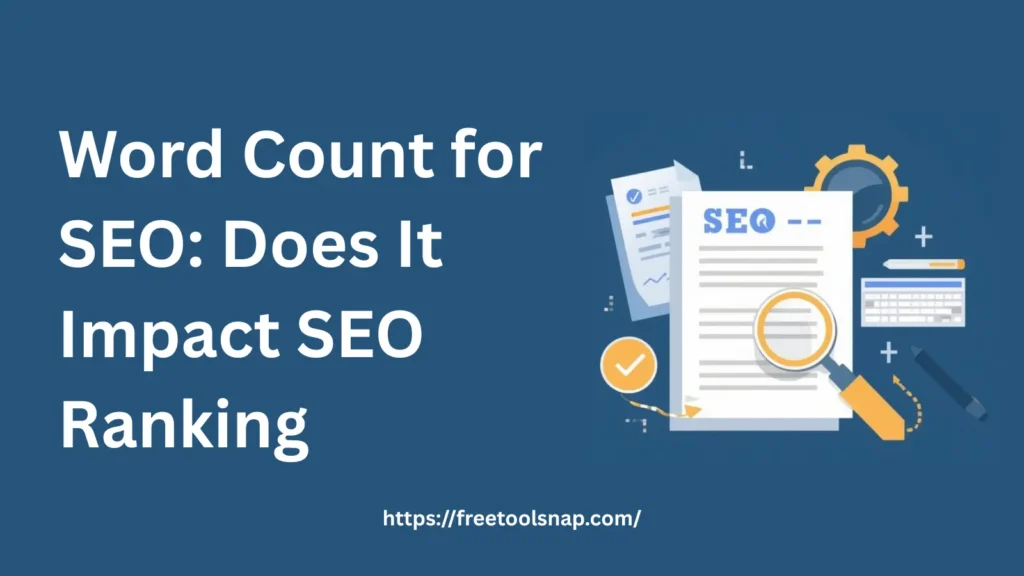Table of Contents
ToggleWhen discussing SEO, one of the most common questions people ask is, “Does word count really matter for SEO?” while planning their content strategy. As search engines are constantly evolving, many content creators, bloggers, and digital marketers claim that articles need to be long.
The truth about word count is that it only influences SEO performance, but not in the way most people think. But it doesn’t mean word count is irrelevant. Instead, it plays a supporting role in helping search engines understand content depth and topic coverage.
Many bloggers or digital marketers implement seo strategy by understanding the relationship between content length, search intent, readability, and engagement, which will help you create high-performing pages that rank better in Search Engine Results Pages (SERPs).
In this article, we’ll break down whether word count impacts SEO in 2025, myths about content length, and highlight best practices for writing blog posts and web pages that rank higher.
Does Word Count Matter in SEO?
Word count is the total number of words used in the article, and when you ask, “Does word count really influence rankings?”. The short answer is no, Google doesn’t treat word count as a direct ranking factor, but overall length, content depth, and readability still influence user satisfaction.
It’s often said that the ideal word count for an SEO-optimized article is around 2000 words per article for better ranked in SERPs. But the truth is what type of content you create and what information you are giving to the user.
Google doesn’t rank pages because they’re long; instead, it ranks content that provides depth, relevance, and value to the reader. That means a 1,000-word blog post that delivers clear relevance and actionable insights can easily overtake a 3,000-word article stuffed with fluff.
This means quality of content plays an important role in SEO instead of content length. Therefore, it’s said SEO is all about quality, not quantity. So, don’t focus on word count; instead, focus on delivering to match search intent, improving readability, being well-structured, and keeping users engaged.
Word Count is Not a Ranking Factor
One of the biggest misconceptions in SEO is that word count alone determines where your content ranks. Word count doesn’t find the ranking factor, as Google’s John Mueller stated that “Word count is not a ranking factor. Save yourself the trouble.“

Word count still influences SEO indirectly. Longer articles often perform better because they naturally provide more detailed insights, stronger topical authority, and greater keyword coverage.
Longer articles often perform better not because of the number itself, but because they naturally provide more depth, detailed explanations, and comprehensive coverage of a topic. That is how words count more likely to attract backlinks, increase dwell time, and rank for multiple related keywords.
Although quality is the most important ranking factor for Google’s Algorithm, it is good for Google’s E-A-T principles.
Minimum Word Count for SEO
People’s belief that lengthy articles rank higher in SERPs results, but the truth is, Google doesn’t set a fixed minimum length for SEO ranking. Instead, the search engine evaluates whether your content provides enough value, depth, and relevance to satisfy user intent.
Initially, articles with around 750 words were considered sufficient, but as search engine algorithms evolved, the expected minimum word count for seo blog posts was increased to 1,500–2,000 words for stronger performance.
There’s no universal minimum word count for SEO, but pages that provide enough depth, clarity, and keyword coverage consistently perform better. It’s important to remember that the best word count depends on user intent.
The Role of Word Count in Mobile and Voice Search
As search behavior continues to shift toward mobile devices and smart assistants, the way people consume content has changed dramatically. Today, mobile search and voice search dominate how users find information.
For mobile search, readability is everything. Long, unbroken paragraphs are hard to digest on small screens, so content should be organized into short sections, bullet points, and clear subheadings.
While articles in the 1,000–1,500 word range often perform well on mobile, it’s less about the exact number and more about readability, relevance, and user experience. That’s why writers keep track of length by using a tool like a word counter that helps maintain flow and readability.
6 Effective Ways to Expand Word Count
When it comes to SEO, increasing your word count isn’t about stuffing content with fluff; it’s about delivering genuine value to readers while covering a topic in-depth. If you want to make your article or landing pages more authoritative, here are six effective ways to naturally expand your word count without sacrificing readability.
Provide Deeper Context
Don’t stop at surface-level explanations. By adding background details, examples, and industry insights, you create more comprehensive content that answers not just the “what” but also the “why” and “how.” This naturally increases content length while building authority.
Identify the Search Intent
Every search query has its own intent (Informational, Navigational, or Transactional). When you refine your content with search intent and add sections that meet real user needs, you naturally increase your article length.
Use Long-Tail Keywords
Integrating long-tail keywords gives you opportunities to cover related questions and subtopics. These keyword variations let you answer niche queries, expand on details, and increase your word count for SEO without sounding repetitive.
Expand Into Subtopics
Break your main subject into smaller, well-structured subtopics. Each subheading adds depth and improves readability, giving you more opportunities to include useful insights, practical advice, or case examples.
Update With New Ideas
Refreshing your article with new trends, data, and insights keeps it current and gives you a chance to add extra sections. Updating old posts is one of the easiest ways to boost SEO word count while staying ahead of competitors.
Develop Original Content
Avoid generic repetition. Instead, bring your unique perspective, original research, or first-hand insights. Authentic writing not only expands content length but also positions your site as a trustworthy resource.
Conclusion
The choice of words and the way you present them often impact SEO more than the actual word count itself. Instead of stretching your content just to hit a certain article length, focus on delivering quality, clarity, and relevance.
Keep your writing concise, well-structured, and easy to read so that both search engines and your audience find it valuable. A positive user experience, combined with smart content optimization, will always outweigh unnecessary filler text.
💡 Your turn: How do you think word count affects SEO? Share your thoughts in the comments. We’d love to hear your perspective!


This was time well spent reading.